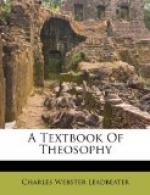The man who finds himself in the astral world after death, if he has not submitted to the rearrangement of the matter of his body, will notice but little difference from physical life. He can float about in any direction at will, but in actual fact he usually stays in the neighbourhood to which he is accustomed. He is still able to perceive his house, his room, his furniture, his relations, his friends. The living, when ignorant of the higher worlds, suppose themselves to have “lost” those who have laid aside their physical bodies; but the dead are never for a moment under the impression that they have lost the living.
Functioning as they are in the astral body, the dead can no longer see the physical bodies of those whom they have left behind; but they do see their astral bodies, and as those are exactly the same in outline as the physical, they are perfectly aware of the presence of their friends. They see each one surrounded by a faint ovoid of luminous mist, and if they happen to be observant, they may notice various other small changes in their surroundings; but it is at least quite clear to them that they have not gone away to some distant heaven or hell, but still remain in touch with the world which they know, although they see it at a somewhat different angle.
The dead man has the astral body of his living friend obviously before him, so he cannot think of him as lost; but while the friend is awake, the dead man will not be able to make any impression upon him, for the consciousness of the friend is then in the physical world, and his astral body is being used only as a bridge. The dead man cannot therefore communicate with his friend, nor can he read his friend’s higher thoughts; but he will see by the change in colour in the astral body any emotion which that friend may feel, and with a little practice and observation he may easily learn to read all those thoughts of his friend which have in them anything of self or of desire.
When the friend falls asleep the whole position is changed. He is then also conscious in the astral world side by side with the dead man, and they can communicate in every respect as freely as they could during physical life. The emotions felt by the living react strongly upon the dead who love them. If the former give way to grief, the latter cannot but suffer severely.
The conditions of life after death are almost infinite in their variety, but they can be calculated without difficulty by any one who will take the trouble to understand the astral world and to consider the character of the person concerned. That character is not in the slightest degree changed by death; the man’s thoughts, emotions and desires are exactly the same as before. He is in every way the same man, minus his physical body; and his happiness or misery depends upon the extent to which this loss of the physical body affects him.




